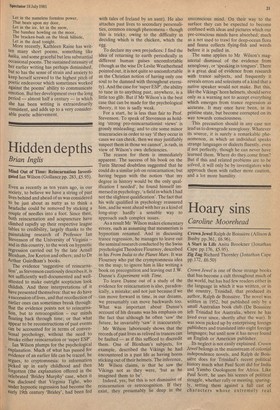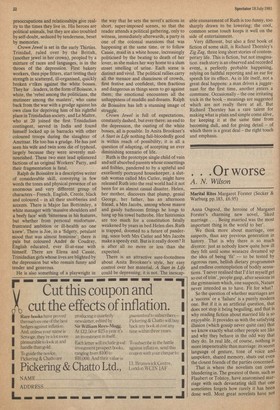Hoary sins
Caroline Moorehead
Crown Jewel Ralph de Boissiere (Allison & Busby pp.361, £6.96).
A Start in Life Anita Brookner (Jonathan Cape pp.176, £5.95).
Zig Zag Richard Thornley (Jonathan Cape pp.172, £6.50) Crown Jewel is one of those strange books that has become a cult throughout much of the world, but has had few readers either in the language in which it was written, or in the country, Trinidad, that produced its author, Ralph de Boissiere. The novel was written in 1952, but published only by a small Australian book club. (De Boissiere left Trinidad for Australia, where he has lived ever since, shortly after the war). It was soon picked up by enterprising foreign publishers and translated into eight foreign languages; but until now it has never found an English or American publisher.
Its neglect is not easily explained. Crown Jewel belongs in the mainstream of colonial independence novels, and Ralph de Boissiere does for Trinidad's recent political history much what Paul Scott did for India and Yambo Ouologuem for Africa. Like Paul Scott, he uses his scenes of political struggle, whether rally or meeting, sparingly, setting them against a full cast of characters whose extremely real preoccupations and relationships give reality to the times they live in. His heroes are political animals, but they are also troubled by self-doubt, seduced by tenderness, beset by memories.
Crown Jewel is set in the early Thirties. Trinidad, ruled over by the British, (another jewel in her crown), peopled by a mixture of races and languages, is in the throes of the depression. First bakery workers, then pipe fitters, start testing their strength in scattered, ill-organised, quickly broken s tikes against the white bosses. They ha. .leaders, in the form of Boisson, a white, the 'rebel among the politicians, the mutineer among the masters', who came back from the war with a grudge against his own class for depriving him of his rightful place in Trinidadian society, and Le Maitre, who at 20 joined the first Trinidadian contingent, served in India and found himself locked up in barracks with other coloured troops during the slaughter of Amritsar. He too has a grudge. He has just seen his wife and twin sons die of typhoid, largely because they were severely malnourished. These two men lead splintered factions of an original Workers' Party, and their fragmentation is fatal.
Ralph de Boissiere is a descriptive writer of considerable skill, conveying in few words the tones and physical presence of an enormous and very different group of characters — French, English, Creole, black and coloured — in all their snobberies and accents. There is Major Ian Bottomley, a white manager with 'massive shoulders and a beefy face' with 'bitterness in his features, but whether from personal misfortune, frustrated ambition or ill-health no one knew'. There is Joe, in a 'fidgety, petulant mood that was almost feminine'; there is pale but coloured Andre de Coudray, English educated, ever ill-at-ease with himself. There are Elena and Cassie, Trinidadian girls whose lives are blighted by the depression but who remain funny and tender and generous.
He is also something of a playwright in the way that he sets the novel's actions in short, super-imposed scenes, so that the reader attends a political gathering, only to witness, immediately afterwards, a party in one of the colonial mansions that was happening at the same time, or to follow Cassie, maid in a white house, increasingly politicised by the beating to death of her lover, as she makes her way home to a slum street smelling of urine. Each scene is distinct and vivid. The political rallies carry all the menace and chanciness of crowds, first festive and confident, then fractious and dangerous as things seem to go against them; the emotional encounters all the unhappiness of muddle and dreams. Ralph de Boissiere has left a stunning image of struggle.
Crown Jewel is full of expectations, constantly dashed, but ever there: an end to the depression, the ousting of the white bosses, all is possible. In Anita Brookner's A Start in Life nothing full-bloodedly good is within reach of possibility; it is all a question of adapting, of accepting an ever diminishing scenario of life.
Ruth is the prototype single child of vain and self absorbed parents whose cossettings and foibles, pandered to by a spiteful and excellently portrayed housekeeper, a sluttish woman called Mrs Cutler, might have released Ruth into the real world had it not been for an almost casual disaster. Helen, her mother, discovers that plump, genial George, her father, has an afternoon friend, a Mrs Jacobs, among whose mauve and gaudy bathroom fittings he longs to hang up his towel bathrobe. Her histrionics are too much for a constitution fatally weakened by years in bed.Helen dies. Ruth is trapped, doomed to a future of pandering, since both Mrs Cutler and Mrs Jacobs make a speedy exit. But is it really doom'? It is after all no more or less than she expected.
There is an attractive sure-footedness about Anita Brookner's style, her easy control over her material. A Start in Life could be depressing; it is not. The inescap able ensnarement of Ruth is too funny, too sharply drawn to be lowering; the cool, common sense touch keeps it well on the side of entertainment.
Very different, but also a first book of fiction of some skill, is Richard Thornley's Zig Zag, three long short stories of contemporary life. This is fiction, but not imagination: each story is an observed and recorded event, a perfectly probable happening, relying on faithful reporting and an ear for speech for its effect. As in life itself, not a great deal happens: a man drives a juggernaut for the first time, another enters a commune. Occasionally — the one irritating trick in the book — meanings are suggested which are not really there at all. But Richard Thornley has a rare talent for making what is plain and simple come alive, for keeping it at the same time from becoming dull, and for giving detail — of which there is a great deal — the right touch and emphasis.



































 Previous page
Previous page